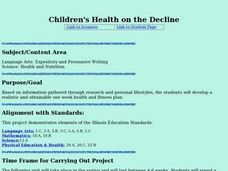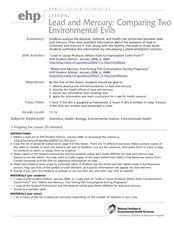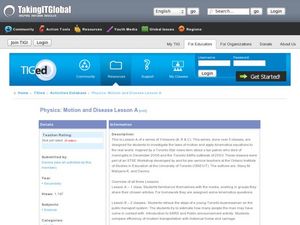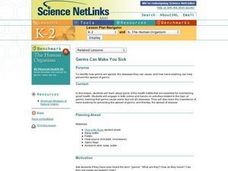Curated OER
Here's To Your Healthy Heart!
Students examine the primary controllable and uncontrollable factors that put one at greater risk for developing heart disease. Through discussion, research, physical tests, and questionnaires they determine whether or not they are at...
Curated OER
Allowing Students to Explore Simple Physics and Marketing in English Class
Scientific method, linear measurements, friction, inertia. Imagine learning scientific vocabulary in an ELA class. Before researching and developing a presentation about simple machines, class members build a common, but decidedly...
Curated OER
Children's Health on the Decline
Demonstrate the importance of children's health with this cross-curricular lesson, which includes elements from health and science as well as expository writing. Middle schoolers develop realistic and obtainable one week health and...
Mascil Project
Sports Physiology and Statistics
If I want to build up my heart, where should I start? Science scholars use statistics in a sports physiology setting during an insightful experiment. Groups measure resting and active heart rates and develop a scatter plot that shows the...
Baylor College
Activity and Exercise
Leave it to the classic jump rope to get your class excited about physical activity! Your class will begin by discussing the benefits of jumping rope as a form of exercise and learning a few different types of jumps. Then in groups of...
Agency for Toxic Substances and Disease Registry
Don't Mess with Mercury (Lesson B)
At one point, people thought mercury was therapeutic for humans, but now we know it is highly toxic. The second of three activities covering mercury focuses on its health hazards if humans are exposed. Pairs research and answer questions...
PBS
Stories of Painkiller Addiction: Myth or Fact
Are opioids the most abused drug after marijuana? How hard is it for young people to obtain painkillers without a prescription? Middle and high schoolers explore the growing epidemic of opioid addiction with a lesson that prompts them to...
Curated OER
Lead and Mercury: Comparing Two Environmental Evils
High schoolers in chemistry or health courses look at the material safety data sheet (MSDS) and periodic table of elements to gather information about mercury and lead, two toxic materials that have been found in food products. They read...
Curated OER
Physics: Motion and Disease
Students read media and identify examples of science technology and society. In this physics lesson, students learn about acceleration and velocity. Students estimate how many people would have come in contact with a person who...
Curated OER
Industrialization, Chemicals and Human Health - Math
Students review the units of the metric system, and practice estimating measures before actually converting between the two systems of measurement. They participate in activities to visualize a concentration of one part per million....
PBS
Stories of Painkiller Addiction: Learning About Opioids
Feeling high is not the only side effect of abusing prescription opioids. Middle and high schoolers learn more about specific painkillers, including Fentanyl, Oxycodone, and Clonazepam, as well as their common brand names and extensive...
Agency for Toxic Substances and Disease Registry
Don't Mess with Mercury (Lesson C)
The health effects of mercury exposure if the focus of the first of three activities about the properties of metals. Pairs research mercury to write, prepare, and share posters, articles, or PSAs with the class.
Curated OER
Mental Health Scenarios
Students define various mental disorders and list some of their signs and symptoms. They identify mental disorders after being given hypothetical scenarios. They share their results with the class.
Curated OER
Teen Driving: Skills, Responsibilities and Reactions
As an introduction to the skills required for and responsibilities of driving, pre-teens and teens engage in a series of activities, chart their response times, and analyze how variables effect these reaction times. Class groups use the...
Curated OER
Physical Health
Students discover and identify how germs are spread, the diseases they can cause, and how hand washing can help prevent the spread of germs. They learn about some of the health habits that are essential for maintaining good health.
Curated OER
Using Ionising Radiation in Medicine
This is an information-intense presentation for any science class you might be teaching that will study ionising radiation. The material is specific to cancer diagnosis and treatment, and one of the forty-two slides also touches on using...
Baylor College
Heart Rate and Exercise
What is the relationship among the heart, circulation, and exercise? Your class members will explore first-hand how different physical exercises affect an individual's heart rate. They will begin by learning how to measure their own...
Agency for Toxic Substances and Disease Registry
Don't Mess with Mercury (Lesson A)
Mercury is the only metal that is a liquid at room temperature. Teach your class this and many more interesting mercury facts by assigning an engaging task. A public relations activity, the exercise informs pupils of the hazards of...
Curated OER
Aerobic/Anaerobic Respiration
Both aerobic and anerobic respiration are introduced in this succinct PowerPoint. The chemical equations for both are included. The last slides give instructions for a lab activity in which pupils use a gas sensor to measure the...
PBS
Stories of Painkiller Addiction: The Cycle of Addiction
Drug addiction, including prescription drug addiction, begins with a reason that's different for every user. High schoolers learn more about the reasons people begin abusing drugs with a set of videos and worksheets that discuss four...
Captain Planet Foundation
Sorting Out Soils
Sift through soil and learn about why it's important for organic processes. After discussing what makes up soil, such as the living organisms and what types of soil have more nutrients, kids sample layers of mulch and deeper soil to...
NOAA
Marine Ecosystems
Be at the top of the food chain when it comes to understanding marine ecosystems. The 21st installment of a 23-part NOAA Enrichment in Marine sciences and Oceanography (NEMO) program investigates marine ecosystems, ocean zones, and food...
American Physiological Society
It’s the Heart of the Matter
Get the class jumping for joy with a fascinating look at matters of the heart. Learners perform physical tasks, collect and analyze heart rate data, and study conditions that affect heart health. Use the action-packed lesson plan to...
American Physiological Society
How Does the Density of a Liquid Affect the Buoyancy of an Object?
Here's a lesson plan that will really float your boat! Introduce physical science scholars to the relationship between buoyancy and density through an assortment of individual and collaborative exercises. Lab groups work together to...

























